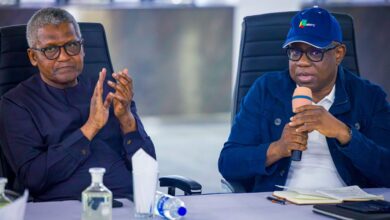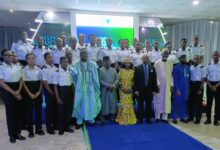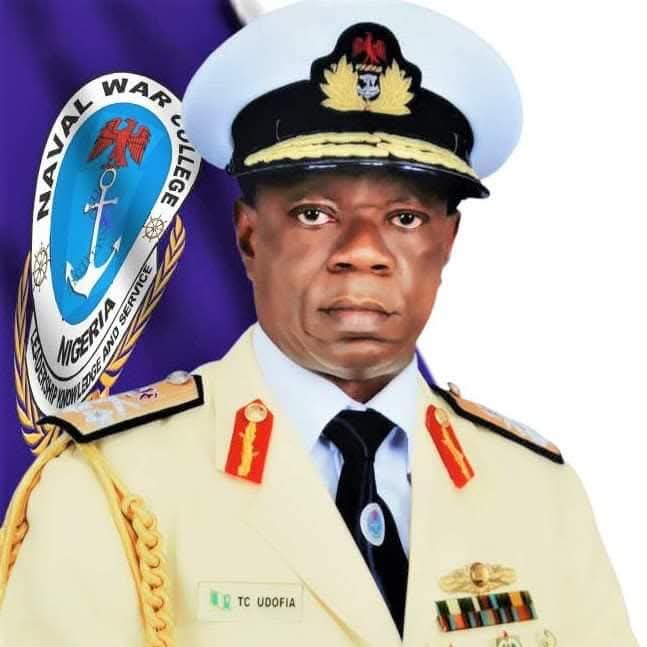
By Maria Yusuf
International Maritime Institute of Nigeria(IMION) at a 2 day seminar in Lagos has postulated that a secured maritime domain holds enormous benefits for Nigeria’s sustainability and overal development of Africa
The International Maritime Institute of Nigeria (IMION) recently launched an executive course on maritime security and global trade, aimed at addressing critical issues in the ocean economy and fostering sustainable development in Nigeria.
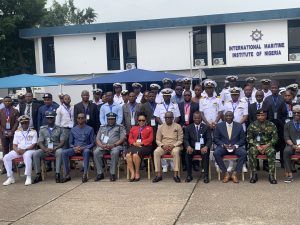
The two-day seminar, themed “Maritime Security & Global Trade”, took place at the Nigerian Navy Ship (NNS) Quorra in Lagos on April 29th and 30th ,2025.
The event brought together maritime experts, policymakers, and industry leaders to deliberate on strategies to secure Nigeria’s maritime domain and enhance global trade.
Rear Admiral Thaddeus Christopher Udofia, Director General of IMION, emphasised the growing importance of the blue economy, noting its potential for economic growth, environmental stewardship, and job creation. He cited the establishment of the Ministry of Marine and Blue Economy under President Bola Ahmed Tinubu’s administration as a key milestone in recognising the ocean’s value.
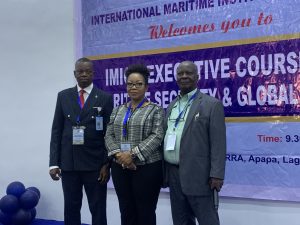
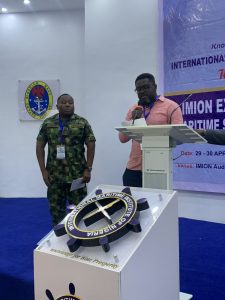
He said this course is designed to equip participants with the knowledge and skills to tackle maritime security threats, navigate complex regulatory frameworks, and propose practical solutions for boosting global trade.
Udofia described the program as a platform for collaboration and knowledge exchange, aimed at empowering stakeholders especially senior executives in the maritime sector to develop and implement policies that advance Nigeria’s blue economy agenda.
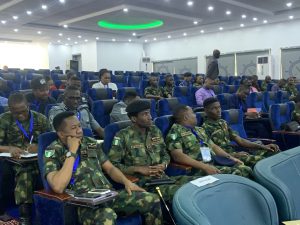
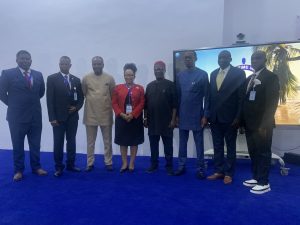
Udofia explained that IMION, established by the Nigerian Navy, serves as a research and training hub for maritime strategies and innovations affecting Nigeria and the wider Gulf of Guinea region.
“This course is equally designed for sea-suit executives, whom we believe are policy formulators and people who can influence policies, as well as design strategies for their implementation. And so we believe that this course is important for the stakeholders, that when they are back to their respective institutes or organizations, they are able to learn, take the lessons from here, to know that maritime security is a strategic imperative for economic growth, and that maritime trade implies that it has a significant influence on economic growth.”
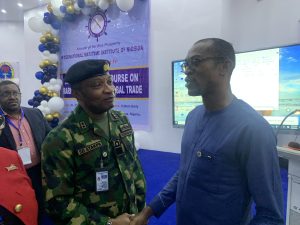

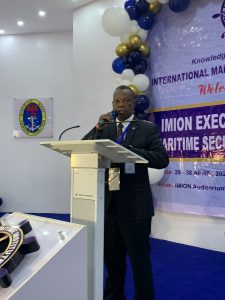
In a keynote paper presentation, Rear Admiral Francis Akpan (Rtd) analyzed the global maritime security landscape, stating that global power dynamics are increasingly shaped by political, economic, and military influence.
“Some of the worst malfeasance in the world occurs at sea,” Akpan said. “The maritime domain will continue to play a crucial role in global stability and economic development.”
He noted that global sea trade rebounded in 2023, growing by 2.4% to reach 12.3 billion tons, following a contraction in 2022. However, he warned that rising maritime activity is happening alongside growing insecurity, illegal trafficking, environmental degradation, biodiversity loss, and the escalating impact of climate change.
Martime security expert and Director General Africa Center for supply chain,Obiora Edwin Madu, in his paper presentation on ” Safe Seas & Secured Trade” said that secure shipping lanes form the backbone of global economic prosperity and any disruption will threaten supply chains worldwide as 90% of international trade is transported by sea.
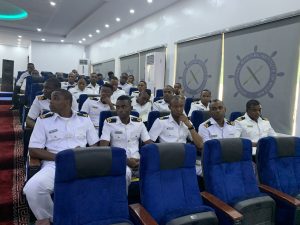
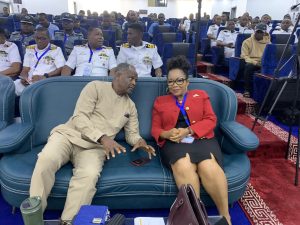
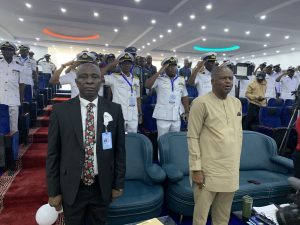
He said that vessel hijacking and cargo theft persist in certain regions, while the increasing digitization of shipping introduces new vulnerabilities.Cyberattacks on vessels or ports could severely disrupt global supply chains. As these threats continue to evolve, adaptive security measures are essential to stay ahead.
On Piracy Hotspot, he disclosed that hue Gulf of Guinea accounts for over 90% of global crew kidnapping. He also said that the Horns of Africa and Southeast Asian Waters frequently see robbery attempt. Although maritime terrorism remains low frequency but potentially high impact. The interconnected nature of global shipping magnifies consequences.
He stressed that security of the sea lanes is not just a military concern, as it underpins everything from food security to energy access and industrial production, thereby affecting billions of lives daily through the good people consume.
The martime expert advised that to ensure martime security, Africa must lead in securing it waters not just to protect trade but to unlock its vast maritime economy potential. With 38 coastal states and a blue economy valued at over $1 trillion annually.
“The financial consequences of Maritime security incidents vary dramatically in scale but are universally significant. While individual piracy incidents might cost millions, major disruption like the Surez Canal blockage can reach billions in daily losses affecting the global economy.
” The development of private security personnel and specialized anti piracy equipment further compounds these operational costs. Directly impacting shipping rates globally. There is a 350% insurance premium increase for vessels traversing high risk zones, vessels are forced to pay $1M as added cost per trip for rerouting around the red sea.
“Critical goods such as medical supplies, food, and technological components face heightened risk demonstratex by the ever given incident that disrupted approximately $60 billion in trade during just on week of the Surez Canal blockage.
“Global maritime security spending exceeds $30 billion annually. These costs affect shipping rates and consumer prices worldwide.”
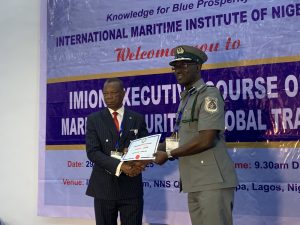
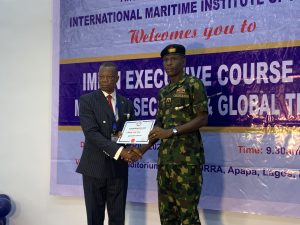
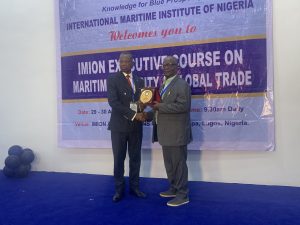
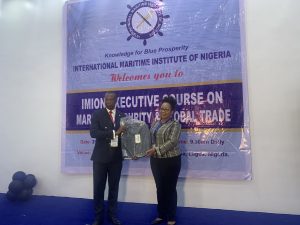
Distinguished legal practitioner, President of Chartered Institute of Logistics and Transport (CILT) and consultant to IMION , Mrs Mfon Ekong Usoro who gave an appraisal of the training program and an update on CILT partnership in federal government blue economy agenda said that the most outstanding aspect of the course was the diverse participation from the military, and the Nigeria Customs, whose interventions really showed that they understand the functions of the customs in global trade in Nigeria.
Mrs. Usoro advocated for enhanced maritime domain awareness, noting that multiple agencies own and operate assets in isolation. She recommended that Nigeria adopt an integrated maritime security strategy and framework, overseen by a single authority, to consolidate assets and eliminate duplication while stressing that the approach would optimize resource allocation, allowing funds to be redirected towards other critical areas of agency operations.
” We had experts as members of the faculty comprised of professors who have expertise in security generally in maritime security and blue economy. And we also had retired and serving officers at lecturers who are experts in blue economy. I think a combination of the paper presentation, the interactive session, and even the ongoing syndicate session now, is the realization that Nigeria does have assets to combat sea robbery or piracy
” So if the maritime security architecture is under the control of one agency and then they collaborate, serious institutional collaboration and linkages and direction, it will be better for the whole country. The communication, the information interchange and the deployment of assets will be better coordinated in real time and would better result in confidence for those who make use of rivers and seas and ports for their trading”
A representative of the Nigeria Customs Service and Special Assistant to the Area Controller of PTML Command , Assistant Comptroller Mohammed Salisu Mukhtar, said the course was incredibly intense, covering the comprehensive syllabus in just two days. It proved to be very resourceful, providing valuable insights into emerging trends and threats in maritime security, as well as the challenges faced by maritime operators and their impact on global trade. Aligning with the Comptroller General of Customs’ policy thrust of consolidation, collaboration, and innovation, He said he will integrate these principles into the NCS policy, leveraging technology to enhance collaboration with sister agencies like the Nigerian Navy, Nigerian Port Authority, and other stakeholders.







